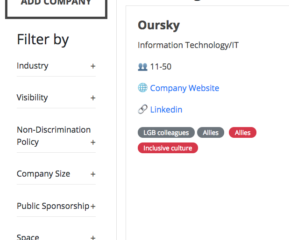Normally, we talk about code at Oursky, but a discussion about period leave in Hong Kong last spring got us thinking about our team culture. Why were people having this debate? Or rather, we realized, the question was: why wasn’t it one for us?
I’m one of 3 technical male founders, so this piece involves input from our company’s 12 female team members (representing 25% of the company). In short, we address the “problem” every day with a simple e-mail update to the entire company.
Also, our “solution” evolved organically. When I asked everyone how it started, no-one could remember. I’d love to share with you how we solved this problem before it even became one.
The company’s period leave: none.

Our simple solution evolved out of another company practice: morning e-mail notices. Team members are expected to e-mail the entire company if they are away from work for any reason (half or full-day).
You could receive all these notifications in the same morning:
- AL
- remote work until noon
- sick again today / have a headache
- I’ll have a physio appointment at
- Pregnancy doctor’s visit
- Period cramps, remote working from home
- Cramps, coming in the afternoon
No questions asked. Instead, people will reply with condolences and well-wishes.
Team culture saves awkward conversations.

Every company wants to have a productive environment. Solving for efficiency has many solutions and depends on the characters of the founders. Me, Rick, and Roy care about quality of code, people, and society.
Our perspectives shaped the company’s approach to self-management — continually improving one’s code, being socially progressive, and using data-driven methods to make company decisions.
Where does period leave fit into this?
No asshole rule.
When a team grows from 3 guys to having 1:4 female team members (who occupy every team and seniority), we quickly learned that for some people, their time of the month feels like this:
The company has a lot of geeks, so we learn new things from every team member. It can be about photography, making furniture, video gaming, growing plants, or raising cats. They’re part of the family, so we don’t judge.
If we don’t judge people for taking leave for physiotherapy or going to a concert, so there’s no logical reason to stop someone from resting if they can’t focus on work. If someone leaving the office early tells you they’re dying, just step aside and don’t be an asshole (we have that line publicly).
Manage yourself.
The other thing is that not everyone has pain when they have their period. Does it make sense to create special leave days?
We’re a medium-sized company where everyone knows each other, so we trust people to manage themselves. We encourage everyone to be as influential as possible to the company and business.
Our rule of thumb for office hours is that everyone attends their meetings and finishes work. Many team members may work remotely in the morning before going to the office. To help people with productivity, we suggest people track with the free app Toggl.
So no, the period leave isn’t needed because we created a higher framework that was fair to everyone: work from home if you need to, when you need to. Be transparent about your reasons.
Top quality code.
Some people might be skeptical. If someone discloses their reasons, will a manager challenge them, or will it affect their promotion? Like other companies, we focus on productivity and quality.
If a team member finishes their work on time, there’s no reason for complaint. We’re an agency working with clients, so once the work is done, there is nothing left to do, and employees who take leave won’t “fall behind”.
Instead, we emphasize quality code. A developer who works quickly, but is not up to coding standard will not perform well. Taking a day off to refocus would be more productive.
We respect individual differences, but when it comes to quality, we expect the same standard from everyone. Everyone just asks a simple question: is this time off good for me and the company?
Socially progressive.
Lastly, this company was founded and is filled with millennials. We believe in social change and contribute to progressive social projects. We also want our team members to have a life and enjoy what they’re doing.
If a team member proposes something that makes them happier and at little cost to the company, we basically won’t say no. Half the time, we might not even notice what we organically adopt.
It makes things easier for team members to casually introduce ideas (i.e. via our Friday evening sharing sessions) to new initiatives.
Tips for tech companies to encourage female developers.

Even though you could create a period leave policy, we think that focusing on the company culture is even better. For one thing, female developers are awesome, so you should definitely try to make your company one that they’d want to work in!
Below are some of our action item tips:
Don’t think of it as a ‘sick leave’ or anything special. Focus on sticking to your goals and standards, and removing barriers that stop team members from achieving them. If you’re using a data-driven approach, what seems “normal” or not doesn’t really matter!
Make changes without changing anything. Nothing changed when team members began announcing period cramps as the reason for leave. Team members took leave like everyone else did and avoided awkward conversations with managers. Change happened overnight and other female team members did the same thing if they felt like it. A solid team culture is when new things are included, rather than added as extra, as part of the company.
Working together is a learning experience. Some of the guys never knew women could have period cramps, but they found out anyway.
Spend energy solving, not judging. We didn’t need a policy because we have a team culture that encourages transparency, quality, and learning. Whether it’s a client project, our own in-house product, a side-project, or a team management issue, we approach problems the same way. Problems can be identified, solutions suggested, implemented, and assessed. We don’t judge the person who comes and identifies a problem. They’re doing the company a favor!
Effective team culture empowers action-based solutions rather than heated discussions.
None of our female team members can remember when the notifications started. It’s just part of our company life.










